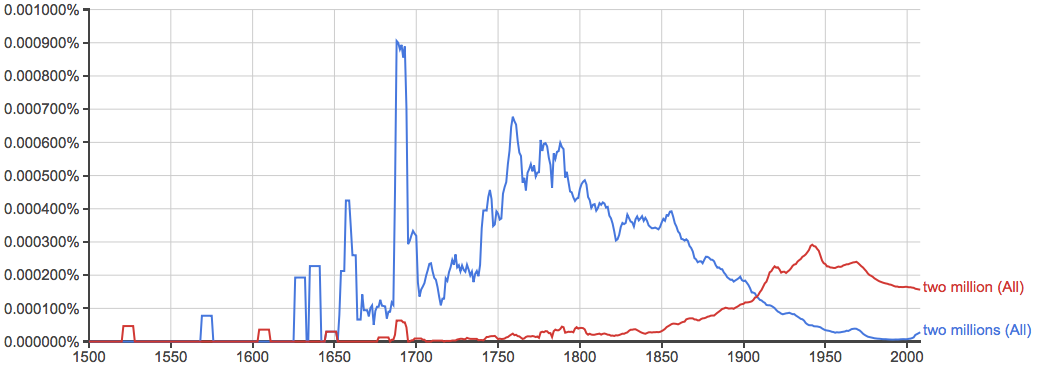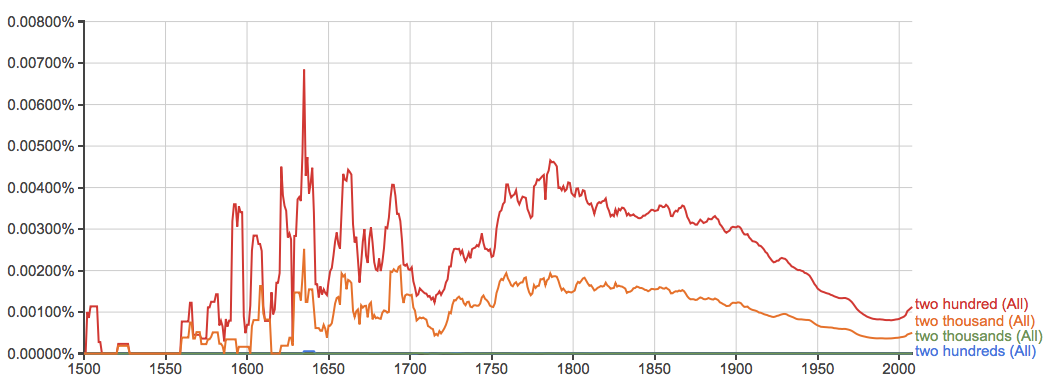Let's say we have the numeral "12,345". Why is it pronounced as "twelve thousand three hundred and forty five" as opposed to "twelve thousands three hundreds and forty five". Are 's's omitted while pronouncing numerals to make the whole thing more succinct and easier to pronounce?
5 Answers
Because in English "twelve thousand" is not interpreted as 12 occurrences of 1000, as in 12 cars, but rather as one occurrence of 12000. Why it's like this, is a matter of speculation.
Languages are different and I guess some languages view 200 as a plural, as two occurrences of 100. English and Dutch do not, and French, as 200_success points out, swings both ways: 200 being deux cents, but 201 being deux cent un.
-
-
7"Why it's like this, is a matter of speculation." It's also the question being asked here today. Commented Nov 5, 2014 at 18:13
-
3@LightnessRacesinOrbit: Indeed it is. However, to some questions the answer is "it is like it is and nobody really knows why" :) Commented Nov 5, 2014 at 18:43
-
1consider twelve hundred cars. It would be "twelve thousand, three hundred and forty five". It is all singular because it is all one singular amount of the item. Commented Nov 5, 2014 at 20:22
-
In English words are pluralized only if they are used as nouns, so if we pluralize a number, we treat it like a noun:
My telephone number contains three fours.
Thus if you say:
twelve thousands, three hundreds, and forty-five apples
this would mean you have only 45 apples, and that you also have 12 thousands, and 3 hundreds. Of course, this wouldn't make sense, because how can you "have" a number like a thousand?
So, if we are using a number as a quantifier, not as a noun, we don't pluralize it.
Another way to look at this is by building up the phrase from smaller parts. First, let's multiply the number of things we have. Compare:
an [apple] (singular)
twelve [apples] (plural)
with
a [thousand apples] (already plural)
twelve [thousand apples] (still plural)
Next, let's add numbers of things we have. Compare:
red apples, green apples, and yellow apples
red, green, and yellow apples
with
twelve thousand apples, three hundred apples, and forty-five apples
twelve thousand, three hundred, and forty-five apples
-
-
-
@Sparr: in the 19th century you can, but the usage has almost vanished. It does follow what Dan says here ("I have twelve thousands" "thousands of what?" "of apples"), but the information here isn't enough to explain why people used to say that but pretty much don't any more. Commented Nov 5, 2014 at 21:23
-
3@jbarker2160: sorry, I've lost track of what game we're playing. Are we talking about saying "twelve thousands of apples" as a pure synonym for "12000 apples" (in which case we should not be telling English-language learners that it's common modern usage), or are we trying to think of rare situations (such as apples being sold in 1000-packs, which personally I have never seen) where that sentence could occur? ;-p But sure, for something that comes in packs you might ask for "a thousand of paperclips" or "two thousands of paperclips" or "two 36s of donuts", although it's not the most common. Commented Nov 5, 2014 at 22:06
-
1@Sparr and tobyink the key word there is "of." You've removed the number from being an adjective that directly modifies the word "apples," so that usage is now valid. Commented Nov 5, 2014 at 22:34
There is not necessarily a logical grammatical justification. In the case of million, usage patterns have shifted.
"Two millions" vs. "Two million"
According to Google Ngram, "two millions" was long the standard expression. However, starting around 1850, its usage declined while "two million" rose in popularity. Around 1920, "two million" became the new norm, and today "two millions" is rarely used.
"Two thousands", "Two hundreds"
In contrast, neither "two thousands" nor "two hundreds" has ever been accepted usage.
If I had to speculate on the reason for the difference, it is probably because million has Latin origins, whereas hundred and thousand have Germanic origins. Therefore, the Old English-based inflection rules have always applied to hundred and thousand, but the French-based rules for million have only recently started giving way.
-
Very interesting. Any information on how exactly "millions" used to be used?– Dan GetzCommented Nov 6, 2014 at 3:06
-
@DanGetz From The Gentleman's Magazine, 1841, chronicling proceedings in the House of Commons: "He thought it would be requisite to make up the permanent revenue to fifty millions sterling per annum." … "There was now an aggregate deficiency of five millions, and a calculated deficiency of two millions more for the year to come." Commented Nov 6, 2014 at 3:57
-
One might explain the singular of "thousand" and "hundred" as in 5,400 in this way: five standing for a unit of one thousand and four standing for a unit of one hundred.
Hundred, thousand etc. are used as adjectives. So, they are not changed to plural number by adding -s to them. For example, Twelve thousand rupees. Here, Twelve, thousand -- both are adjectives qualifying the noun rupees (indian currency). Three hundred apples, etc. Similarly, in "Two dozen eggs", dozen is used as an adjective. Hope, it is now as clear as daylight.


